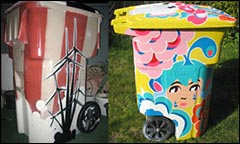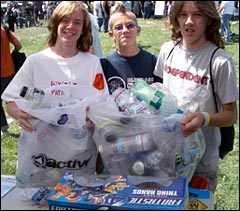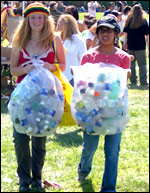What work do you do?
I’m the founder and executive director of Global Inheritance.
What does your organization do?
We reinvent activism for today’s young generation. Our initiatives focus on the power of creativity to communicate and push for progressive social change while rejecting conflict. Global Inheritance targets various subcultures, developing campaigns that cater specifically to each individual demographic.

Bin there, recycled that.
Under the Global Inheritance banner are several different programs with goals ranging from promoting recycling to stopping nuclear-weapons proliferation. TRASHed is a two-pronged program — part art-based and part event-based. The Art of Recycling is a large-scale art initiative bringing together major artists to turn ordinary recycling bins into inspiring works of art. And the TRASHed Recycling Store, set up at various concerts and other events, accepts recyclable bottles as currency toward cool merchandise. Tour Rider is another event-related program; it focuses on traffic congestion and air pollution, giving concertgoers who carpool access to a range of perks including gift bags and VIP privileges.
What are you working on at the moment?
We just finished our first concert as part of a series of events called Public Displays of Affection, which rewards people who use the subway or bus system in Los Angeles. Next on our plate is AFI Fest, a film festival held by the American Film Institute. What I’m really excited about currently is Coachella 2007. We are planning several really cool programs at this year’s festival that will raise the environmental bar for all major music festivals around the world.
How do you get to work?
I roll out of bed and over to the desk.
What long and winding road led you to your current position?
I grew up with parents who had strong morals. I also lived in a progressive town (Portland, Ore.) and went to school at the University of Oregon (although I wasn’t the stereotypical UO activist). I helped organize benefit concerts and worked with a lot of out-of-touch nonprofits. Then I worked on the Truth campaign. And finally, the rise of the internet and meeting Matt Brady, who is currently the Global Inheritance creative director, led me to where I am today.
Where were you born? Where do you live now?
Born in Detroit and ended up in Los Angeles.
What has been the worst moment in your professional life to date?
Having to deal with lame people who care only for themselves.
What’s been the best?

Trading trash for treasure at the Recycling Store.
I’ve worked in several cutthroat industries that employ creative and hardworking people. I love people who are very passionate about life and don’t compromise or change for others. I believe you have one shot at life, so make the most of it.
What environmental offense has infuriated you the most?
Where do I begin?
Who is your environmental hero?
There’s too many to count. I think God and all the religious figures should be environmental heroes. I want to start a campaign with God saying you will be damned if you litter or drive a Hummer in NYC. Think about the positive environmental impact Buddha, Allah, Jesus, and Muhammad could have on society!
What’s your environmental vice?
I fall asleep watching movies and leave the TV on.
Read any good books lately?
Papillon by Henri Charriere.
What’s your favorite place to eat?
I love a Brazilian restaurant called Bossa Nova. It’s open ’til 4 a.m., and has amazing food and decent prices.
Which stereotype about environmentalists most fits you?
I drive a hybrid but fly around in a Learjet.
What’s your favorite place or ecosystem?
South America.
If you could institute by fiat one environmental reform, what would it be?
Instead of running the morning news with celebrity/murder updates, all the major networks would broadcast a 15-minute news piece talking about the environment and ways to integrate new ideas into your everyday life.
Who was your favorite musical artist when you were 18? How about now?
When I was 18, probably N.W.A. Currently, there are several I could pick. Right now, I’m listening to Air, the Virgin Suicides soundtrack.
What’s your favorite TV show? Movie?
I don’t watch much TV, but I get Netflix and rented Live Aid recently. I’m not sure what we were thinking in the ’80s. People were so over the top. I can’t believe people dressed and acted that way. I think the entire world was high.
Which actor would play you in the story of your life?
P. Diddy … and there would be a horrible accident (think Brandon Lee/The Crow) on set, with P. Diddy unfortunately passing away after four days of unsuccessful surgery.
If you could have every InterActivist reader do one thing, what would it be?
Avoid being backseat drivers; take the wheel and show by example what’s possible.
Eric the Read
What’s the typical response you get from young people when they learn about your organization at music festivals or other events? — Name not provided
People are stoked. The only time we get any negativity is when we reach capacity or run out of merchandise. Although festivals are a lot of work, I truly love talking with people who are excited and see potential for major change on several fronts.
What’s planned for next year’s Coachella festival, and how can volunteers get involved? — Mike Wonsidler, San Diego, Calif.
Unfortunately, we are keeping everything under wraps until February. There are some big ideas we are pushing that we don’t want to talk about until certain third parties agree. To volunteer at Coachella or get involved with the programs, .
What would be your dream event to have a presence at? — Grist editors
There are no dream events … just dream locations. We’re targeting India, Russia, and China in 2007-2008. (Fingers crossed.)
Do you feel like the people you reach have a good understanding of issues like climate change, or do they just want cool stuff? And if it’s just the stuff, how do you help them learn about the issues? What kind of follow-up do you do to make sure your message is getting through? — Name not provided
If we visit a wealthy suburb of San Francisco, then yes, kids know about climate change. If we are hosting an event around community housing in Baltimore, the number of people educated on climate change drops considerably. Our overall goal is planting seeds in kids’ heads about the key issues. Any 14-year-old kid who picks up 400 water bottles for a new autographed skateboard thinks about picking up those bottles every time he skates.

Can we bottle that youthful enthusiasm?
You’re always going to get a mixed bag. Some kids are zombies who only want free stuff and other kids want more information to start recycling campaigns in their schools. During certain events, we allow kids to take an environmental quiz to test their knowledge and win more points. When you’re dealing with young teenagers, it gets tricky because they feel like Superman/Superwoman, like they are indestructible. Once you start hitting 19-year-olds and above, that all changes. I’d say 80 percent of them understand climate change or want more information.
We rely on other major nonprofits and government organizations to continue the educational process since Global Inheritance is a small organization with limited staff and resources. Our programs are always a work in progress. Every day, we look to improve the programs and provide a better experience. In the coming months, when we launch our eSAT campaign, ideally, all of this will change. Unfortunately, a lot depends on funding … so please forward to your friends of power and influence.
In the absence of good youth programs like the ones you’ve initiated, what’s the best way to get eco-related information and creative ideas into kids’ hands? — Nancy Burnett, Holden, Mass.
Hosting booths at major music festivals like the Warped Tour is a great fit. (Just make sure your staff fits the same demo as the audience. If you’re targeting 15-year-olds, your staff should be in college or at least under 26.) You can view upcoming festivals and concerts in your city by visiting Pollstar.
We are currently working with a magazine called Dispatch that’s distributed in major classrooms around the country. Over 50 percent of the magazine targets environmental issues. Think about contacting schools and running ads or columns in their newspapers. Reach out to Global Inheritance. We run programs outside of California and plan to open up satellite offices in the future, once we build the infrastructure.
Do you feel like your campaigns (such as the PDA project rewarding those taking public transit) are drawing newbies to the cause or merely rewarding those who already planned to take the subway? — Name not provided
The L.A. subway system on the night of PDA was like a rerun of Real World — every type of person was present, from hipsters to blue-collar workers. I had people telling me every five minutes that this was their first experience on the L.A. Metro, and they loved it. In regards to rewarding people who already take the subway, I think that’s a positive. We are giving people confirmation that they are doing the right thing. Who doesn’t want to be a trendsetter?
What are some challenges or unique aspects to trying to get young people excited about activism and the environment? What inspired you to go after that demographic? How do we keep them interested as they grow up and their interests change? — Grist editors
I’ve dealt with youth culture for so long that I know what gets kids excited about. Not to sound lame, but it’s my art. You treat people with respect, you take risks so your ideas are never outdated, and you give the audience what they want … it’s that simple. If people have good experiences, they stay interested. Program evolution is key. Surround yourself with creative, like-minded people from a wide variety of backgrounds — people who will continue to push the envelope so you’re offering the coolest campaigns in town.
Our biggest challenge is funding. Most festivals don’t have budgets (or don’t want to create budgets) for social programs. But I’m a creative person first and foremost. In January 2007, we are bringing in a business director who will help keep separation between church and state, which will be huge. This will allow Global Inheritance to go global and provide more opportunities to work with smaller markets, nonprofit organizations, and schools.

